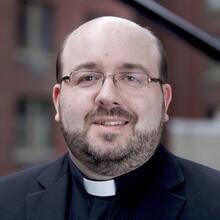A Reflection for the Solemnity of the Assumption
“… the beginning and image of your church’s coming to perfection …”
The preface for today’s liturgy, prayed just before the “Holy, Holy, Holy” in the Mass, offers a beautiful line that does a lot to explain why we celebrate the Assumption in the first place. The preface says that the Blessed Mother “was assumed into heaven as the beginning and image of your church’s coming to perfection, and a sign of sure hope and comfort to your pilgrim people.”
In other words, Mary’s Assumption is a promise of God’s hope and desire for all of us, not a one-off miracle solely for her sake. Through the Immaculate Conception, Mary was free from original sin in order to be able to cooperate completely with God in the Annunciation, welcoming Jesus’ incarnation. She has in full the freedom that all of us were made for. And in the Assumption, we see where that full freedom leads, to the fullness of life, both soul and body, with God. This is what we are made for, and Mary goes before us to show the way.
But as beautiful as the theology of this feast is, it can get a bit abstract. If we’re not already in the spiritual space to respond to its truth, it runs the risk of just sounding like a lot of elaborate ways of saying “Mary is awesome,” as indeed she is.
The readings we’re offered today help ground the cosmic import of the Assumption by reminding us that Mary’s cooperation with God is not aimed primarily at her being crowned in heaven but at the in-breaking of God’s kingdom of love and justice. Mary’s Magnificat proclaims the scattering of the proud and the casting down of the mighty, the lifting up of the lowly and the filling of the hungry.
If we’re not already in the spiritual space to respond to the Assumption’s truth, it runs the risk of just sounding like a lot of elaborate ways of saying “Mary is awesome,” as indeed she is.
If I’m being fully honest, I’m more comfortable with these truths being a bit more abstract, kept safely on a cosmic plane in some kind of metaphysical bubble wrap. Because the reality is that I am—at least in relative terms—much closer to pride and might and wealth than I am to lowliness and hunger. And so the promise God makes through Mary, far more than I am comfortable with, is that the path God lays out, the path Mary has followed, will involve me being humbled, in God’s mercy.
I once preached on this feast a few days after the Pennsylvania grand jury report on sexual abuse in the church was released, and I said then that I could not “imagine a day on which it has been harder to believe that the church is coming to perfection.” The church, too, will be and must be humbled, in God’s mercy, to become what we are called to be, following the promise we see in Mary as our “beginning and image.”
One of my closest Jesuit friends, Paddy Gilger, S.J., who is a contributing editor for America, said this on Twitter a few weeks ago:
It’s because hope and hypocrisy go hand in hand that our age of authenticity struggles so much with hope.
Being a hopeful person means undergoing the humiliating experience of knowing oneself as a hypocrite and nevertheless pursuing the ideal that crystallizes one’s hypocrisy.
In order to share the hope of the Assumption—in order to share any Christian hope at all—we have to start by admitting that both we and the world are broken in a way that we cannot fix on our own. We have to admit that we hope for something we cannot achieve ourselves. And then, even in the midst of our sin and hypocrisy, we begin to cooperate with the freedom God offers, the freedom Mary knew fully, to be humbled in order to be lifted up. Mary’s Assumption is the promise that such hope is better than we can imagine, and the reminder that the way to it is through God’s mercy rather than our own strength.







